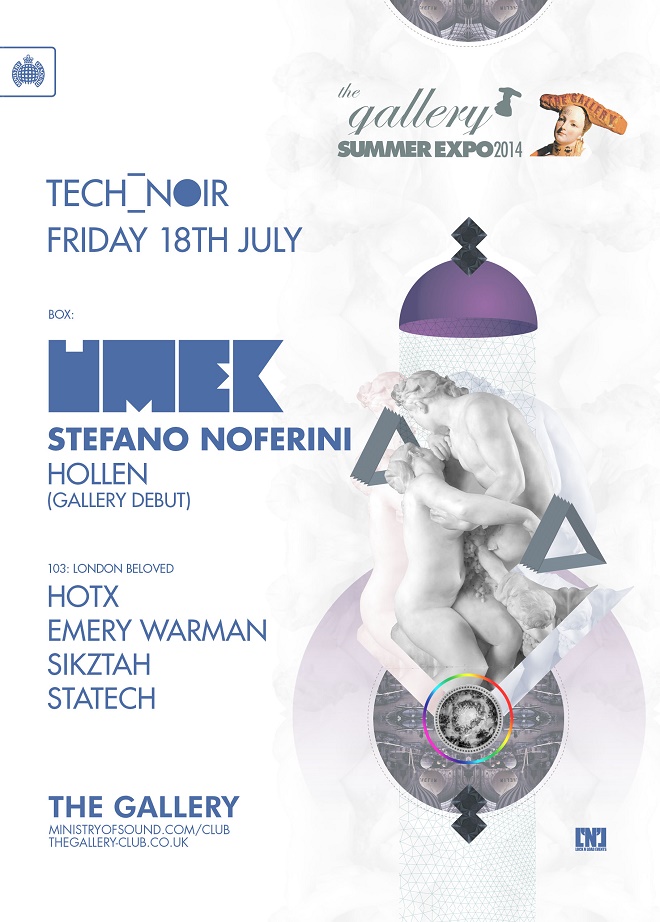Umek was one of the world’s first DJs to perform on 4 turntables. He’s still doing today of course – only better! We took some time out to chat with one of the true legends of the techno scene.
So nice to have you with you us Umek. You grew up in Slovenia. Are you still based there? What’s the club scene like and how often are you playing?
Yes, I’m still living in Slovenia and I can’t imagine moving somewhere else. Some years ago I tried to move my base to Ibiza for the summer, but after couple of weeks I just moved back home. Living in Slovenia is not that handy when it comes to flying in and out all the time as we’re small country with one tiny airport and it’s rare that you’re able to travel with direct flights. But the quality of life here is such that it’s worth doing that transfers. Last year I’ve moved my base to Los Angeles for two months as I was touring extensively in North and South America and for me it does makes sense to do that as a have quite a case of aerophobia and long flights are stressful for me even without lay-overs. That worked well and I plan to do it again this year. But my base is in Ljubljana and I love spending time in my home and Slovenia in general.
Regarding the state of club and festival scene: in the 90s we’ve built our small scene from a scratch and for a decade and a half it was growing, it was ran by some good local and regional promoters. Club K4 in Ljubljana run by Student Union and a mother of regional electronic music super clubs, Ambasada Gavioli, have been the main nests of electronic culture, we’ve had some nice summer and winter festivals for 3,000 – 5,000 people, some specialized radio shows, magazines and websites.
The scene in Slovenia was always a bit more underground, based mostly on various shades of techno and later house, we’ve had our own hierarchy of most popular regional and international deejays and the infrastructure supported steady growth of new talents. In the last 5 or 7 years Dutch and UK promoters got involved and audience got introduced to big flashy indoor and outdoor EDM shows with superstar DJs, pumped up lightning, sound systems and special effects. This way a mass of young people got exposed to electronic music that became a mainstream, but at the same time nobody really paid educated people as everybody started playing on the card of creating the hype instead of creating interest for certain sound.
When the recession hit us, everything collapsed and now there’s no major EDM shows anymore. But that’s not necessarily bad for the scene that went back to the underground. But it will take time to grow new base, new collectives and promoters are already building their own base and with hard work and some luck people will get intrigued again. As far as I’m concerned, I only do 2-3 domestic gigs annually (there’s only 2 million people living in Slovenia) but I’m supporting the scene with infrastructure, some festivals and events, label, radio show as well as helping some young artists.
In 2012 you received support from the Slovenian president Danilo Türk to vote for you in the DJ mag top 100 DJ poll. Firstly, how did this make you feel? What impact did it have on your life or status in Slovenia?
I don’t think this influenced my status in Slovenia that much as everybody knew me before that, even people that don’t really know what I’m doing know that there’s some Slovenian DJ that is very popular all over the world. We already did some five or six Parties with a Cause till then, which are produced by major telecommunication company and supported by major national media campaign that last for months, we gather up to 30.000 people, we spread message of non violence, we’ve gathered hundreds thousands of euros for various charity and social causes…
I met Mr. Danilo Türk for the first time, when he came to the Party with a cause as a candidate. When he got elected, he visited our small company. We did some don’t drink campaigns for young people and he asked me to teach him basics of DJ-work, so it came natural when he supported Slovenian DJs in Top 100 DJs poll. And still, when we meet at some airport he always asks me about my work and based on that questions it seems that he at least briefly knows what I’m doing as he’s aware of some of my projects.
In any case, it’s nice to have some recognition and at least some moral support from my home country. Especially as I had to do everything on my own and we usually don’t get any support from the state and local politicians when we want to do some serious project for a community and music scene. And it means a lot to my mother. And I understand that. As a single mother she always supported me, even when I dropped out of school and national basketball team as a teenager to pursue career in music. She did her job very well.
Click here to vote for Umek in the DJ Mag’s 2014 Top 100 DJs poll
Do you think it’s possible for you to go higher? A lot of established artist over a period of years have moved into other ventures. Some have started clothing ranges. Others have opened restaurants. Are you involved any other business ventures?
It depends what are you measuring the success with, but yes, I believe I can get better deejay and producer and that I can reach much wider audiences as I did ‘till now. I’m doing this for more than 20 year now, I enjoy it as the first day I mixed music for people to dance to and if I weren’t so into it I’d stop doing it at once. The fact is that I’ve never had a breakthrough record or did something that would make me explode on the scene. I grew steadily through all this years, without big jumps and falls, but the trend is still the same: I’m fully booked all the time, my music is getting released on the best and most influential labels in the industry, Behind the Iron Curtain radio show is syndicated on over 150 terrestrial, Internet and satellite radios all over the world, my label 1605 is well placed among tech-house and techno community providing steady stream of Beatport best-sellers and in general I get a really good feedback from people who like this kind of music. I’m not thinking of getting in some other business as I’m fully occupied with music, but the company I co-own with my friends is also involved in some event management, on-line marketing and similar business, though in the end it’s all connected with my career. We do various things to further build project Umek and we might use the knowledge and skills we acquire on running my career on some side-businesses.
You are predominately known as a techno artist but your more recent stuff seems to be Tech House. What was the reason for the change? Do you think techno is becoming too mainstream these days?
Based on the feedback I get from my peers, media and fan base I’d say I’m stuck somewhere between tech-house and techno. Techno purists say that what I’m producing and playing for the last couple of years it’s tech-house and the ones who are considered tech-house artists usually say that’s techno. It seem I’ve found a niche in between and that can only be a good thing. The fact is that I’m not playing the same dark, banging, rough techno sound I used to. But that’s where music took me. I go with the flow, I like to explore new areas but even though I did this transition I was true to myself all the time. I still approach music the same way as I used to 15 or 20 years ago, I’m still very much forward oriented and dedicated to produce something fresh, different, new. In between electronic music made the transition from being totally underground to becoming major force of global pop culture. And as in every genre there are also many shades of techno. Nowadays you can spot some techno music even on mainstream radios, it’s well presented at major mainstream festivals, but a segment of techno artists still prefer to work out of the media spot light and they nurture rougher, edgier, more experimental sound.
Which one of your productions or remixes are you most proud of and why?
I’m very future bound and don’t like to look back that much, but when I get this question, I usually pick up Ricochet Effect. That’s a track from Print This Story EP that was released some five, six years ago. It’s really interesting that I still enjoy listening to it at least couple of times a year – which is something that I don’t do at all when it comes to my other music. I practically never listen to my music after I stop playing it. But producing this one I developed some intensive feelings and I can still always recall them by listening to it.
Can you name any new artists or DJs you are really into right now?
The easiest way to get this information is to check the programs of my DJ performances and radio show. The ones that fall on my mind right now are Heartik, Mike Vale and Simon Doty.
You were one of the first DJs to play on four decks. How do are you DJing now? What equipment are you using these days?
I’ve gone fully digital in studio and as a DJ some five or six years ago as I could not progress any more on the classic analogue gear. My DJ setup consists of two laptops, one with the latest version of Traktor and the other with Ableton Live. I run four tracks at the same time on Traktor trough Ableton where I add different effects and combine this with the latest Kaos Pad and Maschine for additional rhythms to create even more intense live experience. I mix everything on Allen and Heath 92 mixer and I use Native Instruments controllers.
What’s your opinion on sync djs?
It’s here it’s available and it should be used in a way that you can do better job as a DJ. You can lay back and get lazy or you can use all the time saved doing beatmaching and mixing to take your performance on another level doing some additional live editing and such stuff. I’m happy to have an option to do even more with my sets than just syncing records.
There seems to be a growing increase in Vinyl popularity and sales. Should we go back to vinyl? Do you still use it at all?
For me personally vinyl is not an option as I can do much more in digital. But I understand why some DJs prefer vinyl as their medium and with 1605 we support that by releasing our digital best sellers also on vinyl.
You’re headlining Ministry of Sound on July 18th – what’s your thoughts about the club and what do you have in store for the crowd?
Ministry of Sound is an institution, it’s been working when I was still starting my career in music and it was always on the top of the scene since there. I’m performing at MoS for years and I love to come back as it offers really good conditions for my performance. It’s technically good club, it’s equipped with a top sound system and there’s always very responsive and musically educated crowd on the dance floor. As usually I’ll build my set mostly on my releases, remixes and edits as well as music from my 1605 label and other fresh stuff from artists that are associated with 1605 and my other projects. I play a lot of very fresh, yet unreleased music but I’ll also play some big techno and tech-house tunes to fuel the party. The usual Umek stuff.
You have released a sample CD with Loopmasters titled “Umek Loops From behind the Iron Curtain”. When you make a Sample CD do you give all away or hold back on certain sounds / samples and keep them uniquely for your productions? 🙂
Samples that I created for this pack were created intentionally for this bundle and I only used one or two in my productions. I wanted to offer producers something that’s original Umek style but yet unused as I want to see what they will create form that building blocks. And I must say some sounds on that sample pack are triggering my creative nerve and I might use them in some of my further productions although I originally planned not to use them.
How can people get signed to your label 1605?
We actually don’t sign artists but their music. And we don’t mind if they are already established or totally unknown producers, as long as their music is really good. Artists can send their demos to demo@sixteenofive.com and if we find your music interesting enough, our label manager Ina will get in touch and I’ll play their music in my sets and on the radio show once we get the green light.
You’ve pretty much achieved everything there is to do in music. Can you give any tips to artists who are looking to make it in this industry? What are the do’s and the don’ts?
You can’t do much without at least some talent. I don’t find myself a very talented guy, but you have to have at least some, the rest you can develop by learning and working hard to become a good craftsman if you’re not meant to be an artist. The most important things are to be persistent and focused on what you do. It’s very important to have an idea what you want to do and achieve. I’ve been lucky to discover when I was 17 though this can develop in couple of years into the career when you learn a bit about the whole scene and processes. In my opinion you need at least three years of regular studio drill to come to the point your producing music worth releasing. But there the work only begins. Don’t be to thrilled when you get your first release signed. Take that as a pat on the back and motivation to work even harder.
Can you tell us about any other releases, remixes or other activities we should look out for?
I can finally confirm that my new artist album will be released in august on Spinnin’. Before that the remix of Mason’s Exceeder I did with Mike Vale, should be out on Armada.
Click here to purchase tickets for Umek’s show at Ministry of Sound on July 18th





